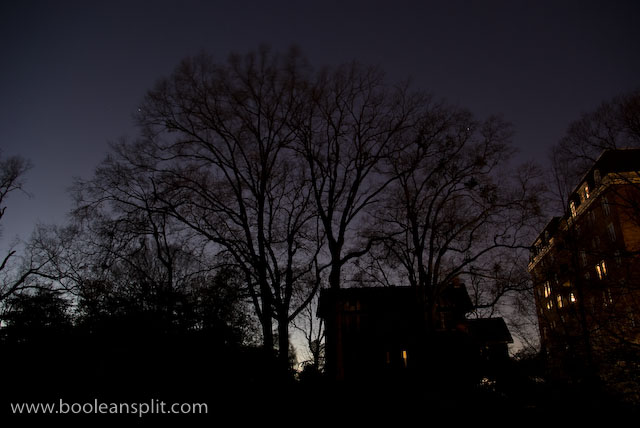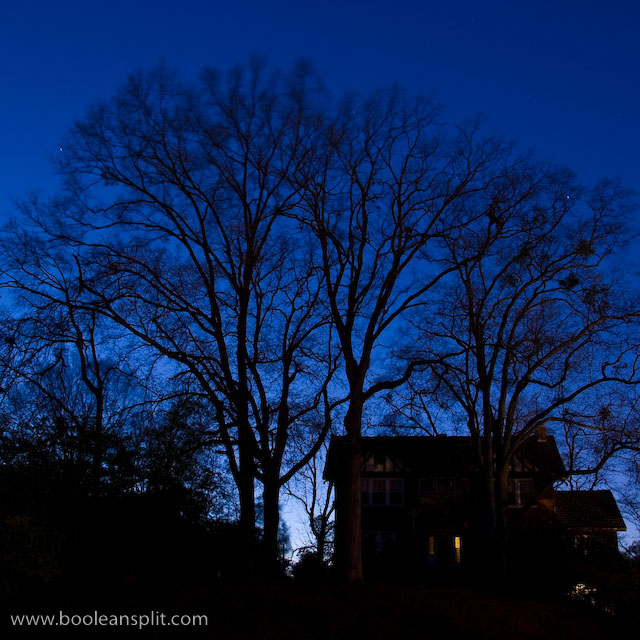Twilight
Dusk is my favorite time of day. I love the rich blues of the sky and the contrast of dark trees and such in the foreground. Normally, these shots require long exposures and a tripod to capture and a bit a tweaking post-process to get the lighting and color right.
This shot required a 30 second exposure at f/9 and ISO 100 with +1EV exposure compensation. I chose f/9 for two reasons. First, f/9 was the smallest aperture I could use and still keep the exposure under 30 seconds in Aperture Priority mode (maximum shutter time without switching to Bulb mode) at ISO 100. I wanted to keep the shot at ISO 100 to ensure tack sharp details, rich saturation and no noise. Second, I have found that my kit lens is its sharpest between f/8 and f/11, so f/9 was a logical place to start.
This photo was processed in Adobe Lightroom to look as close to what my eyes saw as possible. Here’s the original RAW shot straight out of the camera (SOOC) with nothing but my default import processing:

Since I was shooting in RAW I left the white balance at Auto and simply used the histogram display on the LCD to verify a good mix of highlight and shadow detail. After downloading I started off by cropping and straightening the shot a bit. Next I tweaked the white balance to 3700K to get the blue to pop (the sky was too purple at the Daylight/5500 setting and too blue at Tungsten/2850). I then pushed the exposure up another +1EV and dropped the Black slider to 3. Nudging the Fill Light slider to 21 pulled even more shadow detail out. I set Clarity to 11, Vibrance to +25 and Saturation to +21. Finally, I added a touch of Sharpening and Detail (50 & 50) and Defringed all edges.
The Clarity, Vibrance, Sharpening, Detail, and Defringe settings are pretty standard for most of my shots with the Pentax K10D. I find the SOOC RAW files are a little flat color-wise and softer than I like. Also, the kit lens leaves a bit of color fringing on hard edges that Defringing seems to fix well.
The final result turned out very true to what I recall seeing that night in Birmingham. It was a bit windy so the tops of the tree branches are motion blured. The tiny star trails were an unexpected surprise.

January 1st, 2009 at 2:01 pm
Hi,
I for one do really appreciate your descriptions of the photo process. I find them exceptionally helpful.
I found your photos by searching for Pentax lens examples, noticed you were in Auburn where I lived and graduated from 1978 to 1980. I live in Decatur AL now and am trying to become better at the processing side. I come from a couple of decades of film experience including some photojournalism in the 80’s.
But mostly I find your photography delightful – very vibrant and interesting. I hope to read all of your inputs and descriptions and want to say – THANK YOU!
January 1st, 2009 at 2:14 pm
Thanks, Frank! Nice to meet you (virtually at least). I know Decatur well. I imagine that the wildlife preserve and river provide much photographic opportunities for you. I trust you are shooting a Pentax DSLR of some sort. Feel free to e-mail me if you have any specific questions about your camera and I’ll help out as much as I can. I am planning more posts about processing and composition in the future so stay “tuned” :D
January 26th, 2009 at 2:54 am
Wow, super site here!